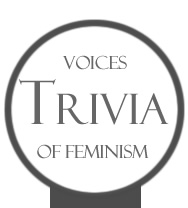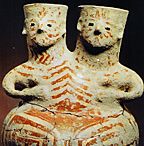Invisible Nature
Leonore Wilson
My good shrink names off a trombone of new medicines with their capacity for change. This is her form of devotion, her creed of repetition, to cure my wound, to rid me of half a century of sorrow, pain and anger as if to leave no trace or shadow of my former self-- the one on fire, the Medea who doesn’t reason, the one filled with the tyranny of things. This angel’s a sleuth, says it’s “her duty” to make me well, to make me whole, as if hauling me back to memory’s garden, before I tasted the black bread of rebellion, before rebellion whispered, “come hither,” for what I feel she says, I feel too much. On the path to “healing,” I’ve tried thirteen elixirs. Thirteen’s enough.
I married at twenty. By twenty-three I had a handful of babies. I said I would not be like my mother, I would not be a priestess to the house of hours. Scorpions would grow in my head before I would simmer the early morning pump water until rust coated the teapot like blood. I would not scrape or slice or stitch. Forget my rural heritage: the dun slither of routine-- homemade casseroles and biscuits, hearts swelling with ample kindness. No! No mops like disheveled women. No pails, bowls, basins. Floors clear as a pill. I was not a suckling to purity. I would not search for my reflection in a coffee table, do lugubrious errands, smell like lemons and paste. Twitch of nerve and muscle, the lamb could perish in the field, the dove and bindweed rise and freeze. But I was also lonely in the sweet prison of my body, so I let love come along and teach me otherwise.
What did I know about men as a girl? A portend: in the middle of my maternal ranch, halfway up the dizzying trail, was a secret box nailed to a tree, and when you pulled up the lid, there was a map of the land with words like Suicide, Little Pond, Four Corners known as Cachetta. What startled me most was not the enormity of my mother’s land, but the pictures that framed the map—nasty pictures cut carefully and pasted so that cocks went into cunts, women’s mouths were sucking their own breasts, women were on all fours like crouching begging animals, shot animals. There was a big picture of a fat woman with her fat legs spread, her breasts like gourds, her gut heavy as if pregnant; and this woman’s hair was unbrushed and she was ugly, she was laughing, her cunt so small you could hardly see it, like a squirrel’s hole, something you could trip into. I looked at the pictures of cocks, cocks like slugs, shrugging cocks like when you put salt on a slug and it curls, and I felt sick at the whole lot. I felt sick looking at the fat lady who got the hunters this far. She should have been ashamed of her place in the box. I imagined the men staring at her with their rifles hunched on their shoulders, spitting at her, and taking a nip and then I imagined them squashing a cigar on her buttocks, her face. I told myself I would not be a woman, a laughingstock doomed to live life in a box.
Eros bore me away from long afternoons in stuffy fields, pledged to slake my desire. I believed at night under the dark cloth that the words whispered were sacred; I read his flesh like a religion, the customary devotion, the bride’s bread and the husband’s….I lay trusting while the world above me screamed like an envious sister. Eros had its drug-rush tactics and took me to Sparks, Nevada. Eros drove into the gated trailer park, a different type of ranch, a ranch for pleasure. I sat in the heat of the Volvo with its red pink seats, with its steering wheel big as an orb. I sat behind it and saw through it as Eros walked right through the cacti, the broken bushes and knocked at the door. I heard the whistles and laughter come from the windows. Eros tried to wave me in. Eros wanted me to watch, but I stayed in the car, thought I was safe, that playful Eros would just get a drink and look around. I thought it was fine because most wives knew this, like going out for coffee in the late afternoon. Didn’t they? I was proud as Eros and the prostitute stared at me through the glass. I thought Eros wouldn’t go through with it. But that time was about the only time he didn’t. Eros taught me about chicken ranches, about strip joints, about pornography and dirty movies; taught me that if I wanted him, I didn’t have choice. Then my belly swelled. I metamorphosed like a god. I ate imagining the stalk joining the yolk sac, the future spine thickening, the tail bending and breaking off. Food was my only duty. I was sister to the milk cow and slopped hog. I pulled a new language from inside my uterus: corpus luteum, ripening follicle, tough plug of mucus. I ate thinking of my shimmering placenta, my maternal blood, those dark passages becoming bone. There were shifts in me and migrations. I ate as if waiting for my own sweet air.
How many layers did they have to get through, how many walls to get to the core where the child waited in his sacristy of blood and water, waiting dependable as Mary? I remember so little when they paralyzed my lower body, made me half-spirit, when they shaved me pre-pubescent, dipped the sponge in the red liquid and iodined my belly like a schoolgirl who skins her knee in the schoolyard. They held the dark cloth in front of me like a shroud. I could not see, split, I was purblind as they were cutting. I was the original assistant stuffed in the magician’s box. I trusted I would not be injured, would come out alive, whole, stand up and walk off like Lazarus. I felt the tugs as the knife went in gentle as foreplay as when Eros patted me, pressed me down as if to shape me, mold me. Then I felt the bigger tugs, twists, as above the curtain the boy came-- bright, pensive-eyed, territorial-- and then his brother pearl-white, quiet, almost complacent. These two followed a year later by another who would want me, divide me.
Eros continued his pre-birth routine while I stayed faithful, became a housewife, a nurturer. Catholic, I envied the women who made love without worry, who were through with conception and birth, their fertility sealed, the tied ends of their tubes like birth-knots on the tips of children’s balloons. How happy they seemed, light as helium knowing freedom. They did not look at their wounds in the shower. Their bodies were theirs, taut-edged and accurate. Their faces guileless, safe. How stiff I became as a mother, lying down at night, feeling the imaginary child kick with its legs of a foal. How could I let it happen again? The tiny accident I feared like losing one’s brakes. Reluctant grownup, I became cold.
My sons, my loves, molded me from the inside out the way man will bore through heavy winter. They stretched and flexed their limbs against my ribs the way lava works and turns inside a cone. It was as if a fiery rain shored them over onto me. I would learn to pin their hands, tameless and happy, back into blankets like clipping the wings of powerful birds. Then they grew up, became animals, pulled at each other, seized each other’s neck, as if to cut it off, called each other ho, bitch, pussy. They shamed each other with blows and blames, slang and rancor. My sharp-edged don’t say that went nowhere. I wanted my milk to piece them together. I wanted to be that bottomless spring, that well of buoyancy. I wrote benign words on their foreheads, scribbled nouns and adjectives as if this could save them. They shuddered, pushed me away, bobbing for breath. I was female to them, and thus invisible.
I endure with my predatory heart. Scent of death and old ash. Thirsty turn of the mirror turning mirror. Sacrificial greedy parts of the tall onyx sunflower. The morning hoarfrost rattles. I am tender and dangerous. I watch the creek water advance in its jacket of slime. What is it to heal? No clutter in the kitchen, nothing to be deticked, dewormed, fed, nurtured. The buds sprout fierce. Maybe the ringdoves when they coo tell of a ripening that is right, that spastic flock of rebel benediction endless in the dawn light breaking, their lingering blue sighs of a fresh measureless future, what I haven’t wanted to know in my accustomed world, always conceding to the masculine handgrip. I think what the doves say is “otherwise,” meaning enter the inexhaustible “whatever else” whistling in shadow, crisp bristle of wind leaping like flame.
And so what if ancestral duty clings close like a bride? So what if you have slept years in that melancholic chore of early romance? No more elixirs or new diagnosis. See what kind of noise disturbs the puffed-up universe, no matter the residual roar. Say goodbye to the numbed drugged tongue, the playhouse adage of “leave your shoes on the porch.” The doves provide a counterpoint to the manic hurrah of science and theory. A rising here, there, nowhere revelation of unimaginable surprise.
Working Notes
As a female (mother, daughter, wife) I have long been aware of the thin line between madness and sanity. The former has been ever close. Shame that my acts and words, coupled with my emotions, could slip from my control often shadows me. Adhering to certain standards of femininity in a patriarchal society means I have, like many other women, found myself in a psychiatrist's office asking for advice and/or pharmaceutical help as if my legitimate restlessness, anger, depression, and anxiety could be medicalized or categorized and therefore eliminated altogether. Yet to assume that much of female depression is caused by an imbalance of the brain is not always a sure hypothesis or a particularly true one. What I am getting at is that depression in women often comes about because of difficult circumstances, circumstances that are demandingly real and not always helped by a pill or a couch. In my case, writing has been my salvation, my constant companion, assuring me like a good female friend. In my art I find strength, courage and clarity.
About the Author
Leonore Wilson lives a rather hermetic life in the wilds of Northern California. Her most fulfilling conversation this week was a nearly 10-minute hi/grr-r chat with a native gray fox (an exceptionally beautiful vixen with a lot on her mind). Leonore taught eighteen years at Napa Valley College and recently had a guest lecturer/professor stint at a private university in San Francisco. Her work has been in TRIVIA, Quarterly West, MAGMA, Third Coast, Madison Review, etc. She has been awarded fellowships and grants for her writing. Right now her main priority is to save her fourth generation female-owned ranch from encroaching land grabbers who don't realize water is gold.

